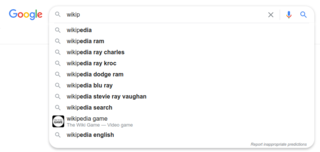
A Web crawler, sometimes called a spider or spiderbot and often shortened to crawler, is an Internet bot that systematically browses the World Wide Web and that is typically operated by search engines for the purpose of Web indexing.
A web portal is a specially designed website that brings information from diverse sources, like emails, online forums and search engines, together in a uniform way. Usually, each information source gets its dedicated area on the page for displaying information ; often, the user can configure which ones to display. Variants of portals include mashups and intranet dashboards for executives and managers. The extent to which content is displayed in a "uniform way" may depend on the intended user and the intended purpose, as well as the diversity of the content. Very often design emphasis is on a certain "metaphor" for configuring and customizing the presentation of the content and the chosen implementation framework or code libraries. In addition, the role of the user in an organization may determine which content can be added to the portal or deleted from the portal configuration.

Citrix Systems, Inc. is an American multinational cloud computing and virtualization technology company that provides server, application and desktop virtualization, networking, software as a service (SaaS), and cloud computing technologies. Citrix claims that their products are used by over 400,000 clients worldwide, including 99% of the Fortune 100 and 98% of the Fortune 500.
Balabit was a Hungarian security firm specializing in the development of IT security systems and related services that help businesses reduce the risk of data breaches associated with privileged accounts.
In computing, syslog is a standard for message logging. It allows separation of the software that generates messages, the system that stores them, and the software that reports and analyzes them. Each message is labeled with a facility code, indicating the type of system generating the message, and is assigned a severity level.
Yahoo! Search is a search engine owned and operated by Yahoo!, using Microsoft Bing to power results.

Citrix Online was the name of the online services division of Citrix Systems. Citrix Online sold web-based remote access, support, and collaboration software and services. Its products are GoToAssist, GoToMeeting, GoToMyPC, GoToTraining, GoToWebinar, Podio, and OpenVoice. Citrix Online used the software as a service (SaaS) and application service provider (ASP) software business models.

A search engine is a software system that provides hyperlinks to web pages and other relevant information on the Web in response to a user's query. The user inputs a query within a web browser or a mobile app, and the search results are often a list of hyperlinks, accompanied by textual summaries and images. Users also have the option of limiting the search to a specific type of results, such as images, videos, or news.
A search appliance (SA) is a type of computer appliance which is attached to a corporate network for the purpose of indexing the content shared across that network in a way that is similar to a web search engine.

Solr is an open-source enterprise-search platform, written in Java. Its major features include full-text search, hit highlighting, faceted search, real-time indexing, dynamic clustering, database integration, NoSQL features and rich document handling. Providing distributed search and index replication, Solr is designed for scalability and fault tolerance. Solr is widely used for enterprise search and analytics use cases and has an active development community and regular releases.
In computing, logging is the act of keeping a log of events that occur in a computer system, such as problems, errors or just information on current operations. These events may occur in the operating system or in other software. A message or log entry is recorded for each such event. These log messages can then be used to monitor and understand the operation of the system, to debug problems, or during an audit. Logging is particularly important in multi-user software, to have a central overview of the operation of the system.
CrushFTP is a proprietary multi-protocol, multi-platform file transfer server originally developed in 1999. CrushFTP is shareware with a tiered pricing model. It is targeted at home users on up to enterprise users.
Enterprise search is software technology for searching data sources internal to a company, typically intranet and database content. The search is generally offered only to users internal to the company. Enterprise search can be contrasted with web search, which applies search technology to documents on the open web, and desktop search, which applies search technology to the content on a single computer.
MetaCrawler is a search engine. It is a registered trademark of InfoSpace and was created by Erik Selberg.
The following outline is provided as an overview of and topical guide to search engines.
CloudStack is open-source Infrastructure-as-a-Service cloud computing software for creating, managing, and deploying infrastructure cloud services. It uses existing hypervisor platforms for virtualization, such as KVM, VMware vSphere, including ESXi and vCenter, XenServer/XCP and XCP-ng. In addition to its own API, CloudStack also supports the Amazon Web Services (AWS) API and the Open Cloud Computing Interface from the Open Grid Forum.
Google Cloud Platform (GCP), offered by Google, is a suite of cloud computing services that provides a series of modular cloud services including computing, data storage, data analytics, and machine learning, alongside a set of management tools. It runs on the same infrastructure that Google uses internally for its end-user products, such as Google Search, Gmail, and Google Docs, according to Verma, et.al. Registration requires a credit card or bank account details.

Hierarchical Cluster Engine (HCE) is a FOSS complex solution for: construct custom network mesh or distributed network cluster structure with several relations types between nodes, formalize the data flow processing goes from upper node level central source point to down nodes and backward, formalize the management requests handling from multiple source points, support native reducing of multiple nodes results, internally support powerful full-text search engine and data storage, provide transactions-less and transactional requests processing, support flexible run-time changes of cluster infrastructure, have many languages bindings for client-side integration APIs in one product build on C++ language.
An intelligence engine is a type of enterprise information management that combines business rule management, predictive, and prescriptive analytics to form a unified information access platform that provides real-time intelligence through search technologies, dashboards and/or existing business infrastructure. Intelligence Engines are process and/or business problem specific, resulting in industry and/or function-specific marketing trademarks associated with them. They can be differentiated from enterprise resource planning (ERP) software in that intelligence engines include organization-level business rules and proactive decision management functionality.

Octopussy, also known as 8Pussy, is a free and open-source computer-software which monitors systems, by constantly analyzing the syslog data they generate and transmit to such a central Octopussy server. Therefore, software like Octopussy plays an important role in maintaining an information security management system within ISO/IEC 27001-compliant environments.






